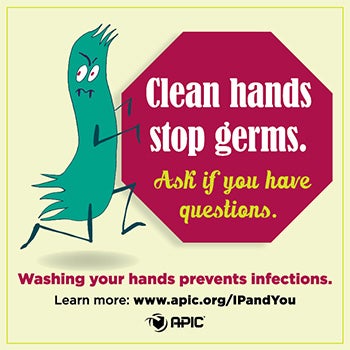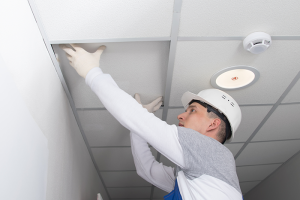AHA, APIC team up to promote the hand-hygiene pledge
 |
| Graphic courtesy of Association for Professionals in Infection Control and Epidemiology APIC and AHA are using social media tools such as memes and Twitter chats to promote hand-hygiene and infection control. |
While rates of many health care-associated infections continue to decline, the importance of involving patients and health care professionals in the prevention of infections remains paramount.
To mark International Infection Prevention Week Oct. 18–24, the Association for Professionals in Infection Control and Epidemiology (APIC) is encouraging health care professionals, patients and their families to take a pledge to actively engage in infection prevention.
The health care professionals pledge focuses on hand hygiene and responding appropriately when patients ask questions, using personal protective equipment, practicing safe injection techniques and getting annual flu vaccines.
The patient and family infection prevention pledge focuses on ways to be involved, such as practicing good hand hygiene, asking appropriate questions – including whether health care providers cleaned their hands — not pressuring providers for antibiotics when they are not necessary and getting appropriate vaccinations, including the flu vaccine.
To support the special week, On Oct. 21 at 12 p.m. EDT, the American Hospital Association and APIC will host a Twitter chat. It will focus on how patients and health care providers can work together to reduce health care-associated infections, including hand washing, influenza vaccination and antibiotic stewardship. The hashtag for the chat is #IIPWChat.
"During this week of heightened awareness, APIC wants patients and health care professionals to commit to actions that will help to protect patient safety and to communicate with each other about ways to stay safe from infections," says Mary Lou Manning, president, APIC.
"The No. 1 way to prevent infections is hand hygiene. Even the simple act of asking if health care providers washed their hands can make a big difference when it comes to preventing deadly infections," Manning says.
In honor of #IIPW, APIC has created new "Clean hands stop germs" posters, stickers and decals encouraging patients and families to ask questions about hand hygiene. The resources are meant to foster dialogue between patients and their providers.
"With the ever-increasing threat of antibiotic resistance, we must prevent infections and preserve our arsenal of available treatments. Patients and families play an important role in preventing infections and we want to make sure that they are armed with the tools and knowledge necessary to help us succeed," says Katrina Crist, CEO of APIC.
"With the support of our association partners and corporate champions, APIC can reach a much greater audience during IIPW," she says.
In addition to the pledge and "Clean hands stop germs" materials, APIC has created numerous items for easy sharing — using hashtag #IIPW — including e-cards, memes, and light-hearted polls and quizzes.
More information on the importance of hand hygiene for health care professionals is available on the APIC website.


